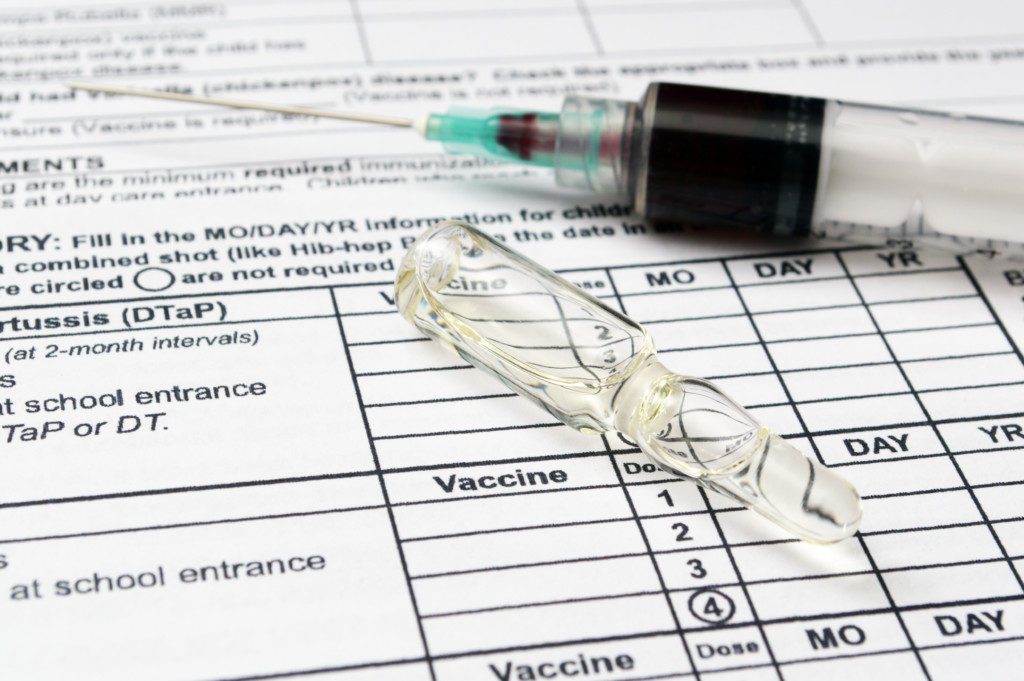This isn’t a debate about the merits of vaccinating your kids. It isn’t an anti-vaccine post. It isn’t even a post about why you should or shouldn’t vaccinate your children. This is a post about a very scary reaction that my four year old daughter had to a vaccine. The worst part was that nobody seemed to believe us.
I should have delayed.
I love to go as natural as possible. We buy organic food, avoid toxic sunscreens, and try to use organic bug spray when we can. When it came to vaccines, I always thought it was better to be safe than sorry. While I didn’t really see the need for the chicken pox vaccine, I did not question the polio or diphtheria vaccines. Contracting those diseases seemed to be much scarier. I had been surprised to find that many naturopathic physicians were not anti-vaccine. Most even supported the idea that delayed vaccine schedules are optimal. I had discovered the option of a delayed schedule a little later than I had wanted. By the time I considered a delayed vaccine schedule, I was worried that it would affect the doses my daughter had already received.
Most times, my daughter had a “typical” reaction to the vaccines she received. There was often redness at the injection site, a very low fever, and some irritability. When we arrived at our checkup, I didn’t give the vaccines a second thought. The nurse would administer a booster for DTaP and Polio in one shot. As usual, my girl was a trooper and didn’t even cry. But just 48 hours later, we started to see some strange reactions.
It began with hives.
Close to FOUR days later, a rash of hives began on her arms and all around the injection site. Doctors seemed to think that it was some excessive allergy to the amount of pollen in the area. I couldn’t argue with that. This spring had left me somewhat dependent on allergy medication. I had experienced a flare up just hours before her hives came out. With a prescription for some Benadryl, the hives went away and all seemed fine.
Four hours later, I went in to check on my daughter and noticed new hives coming out all over her trunk and extremities. Wondering if this had anything to do with the vaccine, I began expressing concern to a variety of healthcare practitioners. I was told it was “too long” after the vaccine to have any reaction. With some more Benadryl, the hives once again dissipated and all seemed back to normal.
A trip to the ER.
Approximately 24 hours after her last reaction, my daughter began showing hives again. This time they cropped up near her mouth and face, and she began having trouble breathing. I immediately took her to the emergency room, knowing that this could be a very serious situation. Several nurses dismissed my concern over the vaccine, but finally one doctor said that it was most likely the vaccine. Having been an allergy kid myself, I had hoped that I would never experience the type of panic that sets in when a full blown allergic reaction is happening.
My daughter has no allergies, never had an allergic reaction to anything. She has maybe had a total of three illnesses requiring antibiotics since birth. Overall, she’s a very healthy kid. I was completely caught off guard with this reaction. I began to blame myself for not listening to my gut when it came to spreading out the vaccines. Luckily, with some steroids and Benadryl, we were able to suppress the immune system enough to stop the reaction and the hives. None the less it was scary.
What should you do?
While I am not sure why this particular vaccine caused such a reaction, I know that I can’t be the only one. In a perfect world, combined vaccines that shock the immune system should be separated and administered over a longer period of time. I am so glad that I was able to recognize the signs of a serious allergic reaction and take the necessary measures to keep my daughter safe. It is my hope that we, as mothers, can share our stories in hopes that we can prevent something awful happening to any child.
The only advice I can offer is to watch your children carefully. We always know when something is amiss and it’s best to be turned away as being overprotective than to have something far worse happen. Hives can run the gamut from benign to life-threatening, but they are never to be ignored. Even if your child doesn’t need a trip to the ER, definitely make an appointment with your doctor to discuss the hives and their possible causes. Nobody wants to end up at the ER, but I’m glad I was able to get the care and treatment I needed for something I never expected.




























Wow Keira! – that sounds awful and scary! Glad your daughter is on the mend. I’m so glad you talked about this! We had a similar experience a few weeks ago, and I’ve been afraid to tell anyone for fear they would immediately jump into the vaccine debate (which was not what I was saying!) I’m so relieved to find your experience comes as an objective voice for real moms. Thanks for sharing!
My husband had a reaction to a small pox vaccine in the military. It took a while to figure that one out. He is ok now but now I worry about our kids. Luckily it isn’t a routine vaccine. I think it is silly that they dismissed because of the timeframe. Sometimes allegories present as something small and then turn into a bigger problem.
Yes! My 4-month old stopped breathing less than 24 hours after her vaccines. My neighbor called 911, but by the time the ambulance arrived she was 100% fine.
We spent 2 days in the hospital running every test possible. I made sure every doctor that saw her knew about the recent vaccines- but each of them completely dismissed it. We left the hospital with a diagnosis of “possible acid reflux.”
It’s taken years of research, but I firmly believe it was a vaccine reaction (even then, my mama gut was telling me that- just hard to be dismissed by so many great doctors!) I’m with you- not arguing the whole concept- but feel it’s imperative for the safety of our children for fair reporting from doctors! I believe they are SO quick to label any reaction something other than “vaccine related!”
Thanks for sharing your story!!!
Sarah, have you heard of Hypotonic Hyporesponsive Episodes (HHE)? According to the CDC, this used to occur to 1 in every 1,750 children after the DTP (the whole cell version of the vaccine we now give, the DTaP). It is when an infant goes blue/gray due to reduced oxygen, can’t move its arms or legs or vocalize (or has reduced ability to do so), and sometimes leads to complete collapse. Now the CDC claims it is so rare they don’t know how often it happens. However, they also don’t require HHE to be reported to the Vaccine Adverse Event Reporting System, so they aren’t collecting data on it.
As you mention in your comment, so many adverse events are not reported by doctors, and that is not okay. It is the law for them to report certain events (HHE isn’t one of them) that are a contraindication for further doses of a vaccine. However, there is no professional, legal, or financial consequence to medical professionals who do not, which means that the law gets ignored on a daily basis across this country.
Please consider contacting your federal legislator and asking for a meeting with a staffer regarding the fact that the 1986 federal law needs to be amended to add a consequence for non-reporters. You can bet the professional medical associations would start doing their duty and training their doctors on adverse events if there were a consequence for not reporting those required by law. And death (SIDS/ SUDS) is not required to be reported, but absolutely should be. I’ve already met with my legislator regarding this huge problem, but he won’t do anything unless other federal legislators also bring this problem forward.
“A hypotonic–hyporesponsive episode (HHE)
is an adverse event after childhood immunization,
usually with a pertussis-containing
vaccine. Originally described by Hopper, HHE has
been defined as the sudden onset of limpness, decreased
responsiveness, and pallor or cyanosis occurring
within 48 hours after immunization, age 10
years or younger, and duration of event from 1
minute to 48 hours.2 HHE has been estimated to
occur once every 1750 diphtheria-tetanus-pertussis
(DTwP) immunizations.” http://pediatrics.aappublications.org/content/pediatrics/106/4/e52.full.pdf
My daughter had a horrible reaction to her 2 month vaccines as an infant. Being a first time mom, I didn’t know better at the time. Went through months of testing and numerous specialists, none of whom ever questioned vaccines. Finally did some research and found the right doctor who confirmed it was indeed the vaccines. It happens more often than most people think. Doctors seem either scared to question vaccine safety or unaware of the risks and reactions.
Thank you for sharing the story and raising awareness on this
Yes to all replays I love kids! They only deserve the best but becasevof big pharma profits instead of proven science is helping our .gov but paying for no law suits for vaccine’s because of the lyers at the CDC! Heard immunity look up the movie documentaries called VAXxed, the head of CDC comes out with classified information they are hiding from the American public!
Since my own baby had disastrous adverse effects from a DTaP vaccine, I’ve spent hundreds of hours researching vaccines and their effects.
Here I just want to say that spacing out vaccines does NOT prevent many of the worst effects of vaccination.
It doesn’t prevent blood agglutination and the micro-strokes it causes in specific areas of the brain.
It doesn’t prevent — actually, it may exacerbate — serious “bystander damage” to the brain by inappropriate activation of the brain’s own immune system.
It doesn’t prevent dysregulation of the immune system (lowered cellular immunity, increased allergies, autoimmune disease).
It doesn’t prevent sensitization to peanuts and the development of life-threatening peanut allergy (due to peanut oil being used as an adjuvant in some vaccines).
It doesn’t prevent the extremely common pattern of adverse reaction to a vaccine becoming more severe with each repetition of the vaccine.
If you want to research adverse effects of vaccines, two good places to start are Neil Miller’s book “Miller’s Review of Critical Vaccine Studies” and neurosurgeon Russell Blaylock’s article “The Danger of Excessive Vaccination During Brain Development” (easily found on the web).
Hi Keira,
Writing to you from N CA in hopes that you and your readers will watch/read the presentation I gave last year at WAPF’s 17th Annual Wise Traditions Conference. They had a daylong vaccine track, and I was thrilled to be invited to speak. Below is a link to my presentation. It is an 80-min. comprehensive overview of many vaccine-related issues…issues that every parent needs to know about prior to allowing their child to be vaccinated. In good health, Laura
“Vaccines: What Is There to Be ‘Pro’ About?” by Laura Hayes
http://www.ageofautism.com/2016/12/vaccines-what-is-there-to-be-pro-about-laura-hayes-to-weston-a-price-foundation-conference.html
We just got the same shot for my son on Friday. By Saturday afternoon he had a 102.4 fever. Sunday morning he couldn’t walk because his legs hurt and had to be carried downstairs. Sunday night he has three night terrors and this morning still woke up with a low fever. This DTap/IPV shot has been rough on us too. But of course compared to polio I wouldn’t hesitate to go through it again. Perhaps with all the hard time he’s having he’d be one to suffer most if he caught the disease?? No allergic reactions for us though.